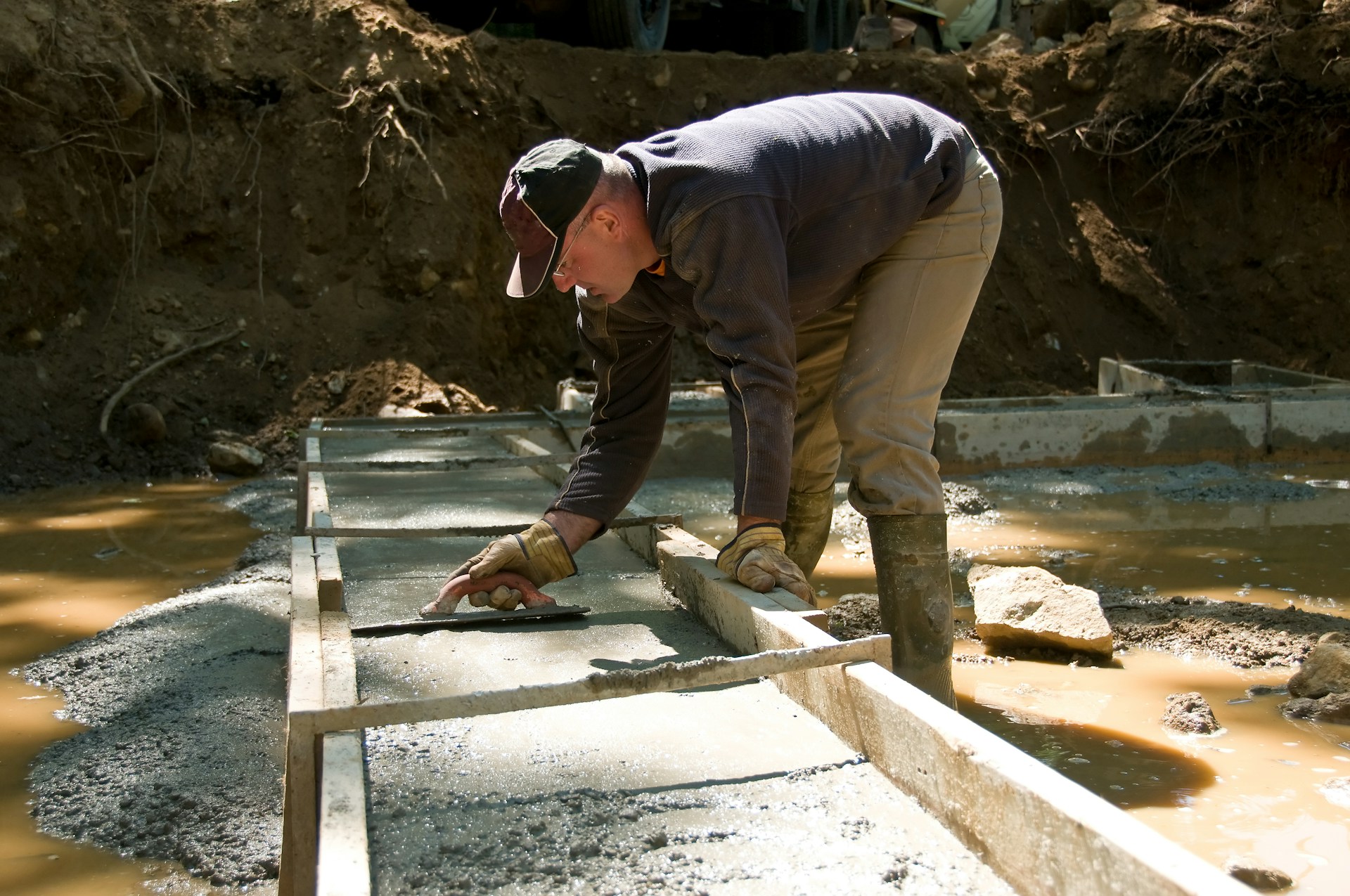Worried about what foundation repair might cost you?
You’re not alone. The average foundation repair ranges from $2,200 to $8,600, with most homeowners spending around $5,000. But prices can swing higher or lower based on several key factors.
From minor cracks to serious structural damage, every foundation issue is different. Some fixes may only cost a few hundred dollars, while major repairs could reach $20,000 or more. That’s why it’s important to understand your options early.
At Helicon, we’ve helped Florida homeowners since 2004 with expert inspections and permanent repair solutions. We focus on long-term protection and clear communication — no guesswork, no surprises.
In this blog, we will talk about:
- What affects foundation repair pricing and how to plan for it
- Repair options based on foundation type and damage severity
- How to budget, compare quotes, and save without cutting corners
Let’s walk through what you need to know before you commit to any foundation repair project.
Understanding Foundation Repair Costs
Knowing what affects foundation repair costs, how pricing works, and the typical price ranges can help you plan your budget. Repair expenses depend on many factors, including the damage type and repair method.
Here’s a clear guide to these details.
What Influences the Average Cost of Foundation Repair?
Several factors impact the cost of fixing a foundation.
- The severity of the damage is a major one. Minor cracks or small settling might only need simple repairs, while severe shifting or sinking requires more extensive work.
- Your home’s location also matters because labor rates and material costs vary by region.
- The type of foundation—whether slab, crawl space, or basement—can change the repair method and price.
- Soil conditions, like those in Florida, often need specialized soil stabilization, adding to the cost.
- Finally, the repair method chosen affects expenses. Techniques such as mud-jacking are less costly, while installing helical piers or full foundation lifting can be significantly more expensive.
Common Pricing Models
Foundation repair typically follows one of two pricing models: fixed cost or per unit cost.
- Fixed costs give you a set price for the entire job, which can be easier to budget for but may require a detailed inspection first.
- Per unit pricing charges by the number of piers installed or the area repaired. For example, a contractor may charge per pier for foundation lifting or per linear foot for crack repairs. This method gives flexibility but can be unpredictable if the damage is worse than expected.
Some companies provide detailed quotes upfront and assign a dedicated consultant to explain costs clearly, helping you avoid surprises.
Cost Range Overview
Foundation repairs cost differently depending on the factors above.
- Minor repairs, such as filling cracks or stabilizing small areas, usually cost between $500 and $2,500.
- Average repairs generally fall between $2,000 and $8,000, covering common fixes like slab leveling or pier installations for moderate damage.
- Severe cases that require foundation lifting or pier replacement can cost between $15,000 and $30,000 or more.
These are less common but necessary for significant structural problems.
| Repair Type | Typical Cost Range |
|---|---|
| Minor crack repairs | $500 – $2,500 |
| Average repairs | $2,000 – $8,000 |
| Foundation lifting | $15,000 – $30,000 |
Main Types of Foundation Repairs and Their Costs
Foundation repairs can vary widely based on the type of foundation your home has and the damage it has experienced. Costs depend on how serious the problem is and what method is needed to fix it. Knowing the common repair types can help you plan your budget better.
Slab Foundation Repairs
Slab foundations are common, especially in warmer climates. Problems often include cracks, sinking, or uneven slabs caused by soil movement or water damage.
Repairing slab foundations typically involves concrete lifting or mudjacking to raise settled slabs. Depending on the size and severity, the cost for slab foundation repairs generally ranges from $500 to $5,000.
Small cracks may only need sealing, which can cost a few hundred dollars. Major sinking or breaks may require injecting polyurethane foam or installing piers under the slab, which can cost more.
Our team offers concrete lifting services that use non-invasive foam to stabilize and level sinking slabs quickly. This method is less disruptive and provides long-lasting results without replacing the entire slab.
Pier and Beam Foundation Repairs
Pier and beam foundations rest on concrete or steel piers that support wooden beams under the house. Common issues include rotting wood, pier shifting, or settling.
Repair often requires leveling the house by adjusting or replacing piers and reinforcing beams. The cost of pier and beam repairs typically ranges from $2,000 to $10,000. Minor repairs like pier jacking or shimming are on the lower end of the price range. Full pier replacement or adding additional support piers increases the price.
Pier and beam foundations should be inspected regularly, as damaged piers can lead to sagging floors and structural instability.
Basement Foundation Repairs
Cracks, leaks, or bowed walls in basement foundations can be caused by soil pressure or water infiltration. To stabilize and prevent further damage, these problems often require waterproofing, wall anchors, or carbon fiber straps.
Basement foundation repair costs are usually higher, ranging from $5,000 to $15,000 or more, depending on the extent of the damage. Waterproofing interior walls or applying crack sealants costs less, while major structural fixes like wall reinforcement and underpinning raise the price.
Addressing basement issues early can prevent water damage and costly repairs later.
Foundation Repair Cost Breakdown by Method
Not all foundation repairs cost the same, and that’s because not all solutions are equal. Some fixes are quick and straightforward, while others require heavy equipment and weeks of work. Understanding what each repair method involves (and how much it generally costs) can help you make informed decisions, compare contractor quotes with confidence, and plan your budget without guesswork.
Here’s a breakdown of common repair methods and what they typically cost:
| Repair Method | Average Cost Range | Best For | Notes |
| Crack Injection (Epoxy/Poly) | $250 – $800 per crack | Small vertical cracks in poured concrete walls | Quick fix but not ideal for structural issues |
| Slabjacking (Mudjacking) | $500 – $1,500 | Sunken concrete slabs (driveways, patios) | Cost-effective for minor sinking; not suitable for major settlement |
| Piering (Steel/Concrete Piers) | $1,000 – $3,000 per pier | Severe foundation settlement | Permanent solution, especially for unstable soil |
| Wall Anchors | $700 – $1,200 per anchor | Bowing or leaning basement walls | Requires some excavation; long-lasting reinforcement |
| Helical Piers | $1,500 – $2,500 per pier | New construction or lightweight homes | Good for areas with poor soil conditions |
| Drainage Correction | $1,000 – $5,000+ | Water damage and poor runoff | Can include French drains, gutters, grading |
| Underpinning | $5,000 – $15,000+ | Major structural issues | Most invasive and expensive, but stabilizes entire structure |
Factors Affecting Foundation Repair Prices
Several key elements influence the cost of foundation repair. These include the extent of the damage, the ground conditions under your home, and the location of your property. Understanding these factors helps you prepare for potential expenses and make informed choices about repairs.
Extent of Structural Damage
The level of damage to your foundation directly affects repair prices. Minor cracks usually cost less, often between $350 and $4,000.
More severe problems like shifting or bowing walls require extensive work and can cost $10,000 to $25,000 or more. Repairs may involve stabilizing the soil, installing piers, or replacing parts of the foundation.
Each step adds to the cost. You should get a detailed inspection to identify all issues, including hidden damage to floors or walls.
Soil Conditions and Site Accessibility
The type of soil under your home plays a big role in repair cost.
Expansive clay soils, common in Florida, can cause more foundation movement and require more complex solutions like soil stabilization or helical piers. Accessibility also matters. If your foundation is hard to reach—such as being close to landscaping, near water, or on a tight lot—the work becomes more difficult and labor-intensive.
This adds to the price. Your soil type and how easy it is to work around your property impact the choice of repair methods and overall cost.
Property Location
Where your home is located affects foundation repair costs in two main ways: local labor rates and regional soil types.
Urban areas tend to have higher labor costs, which raises repair prices. Rural areas might have lower labor costs but can face delays if specialists need to travel. Regional soil conditions also vary, requiring different repair methods.
For example, homes in Florida often face sinkhole risks and loose soils, increasing the need for specialized solutions. Your location may also influence permit requirements and inspection costs, which should be considered when budgeting.
Breakdown of Additional Expenses
Beyond the basic foundation repair costs, several other expenses can affect your total budget. These include fees for inspecting your foundation, costs related to obtaining permits, and expenses for restoring your home after repairs.
Inspection and Assessment Fees
Before any work begins, a professional inspection is necessary to understand the extent of your foundation issues.
Inspection fees typically range from $300 to $700, depending on the size of your home and the complexity of the problem. This step involves checking for cracks, soil movement, and structural damage. The assessment helps determine the best repair method and provides a detailed cost estimate.
Some companies include this fee in the overall repair cost, but others charge it separately. Getting a thorough inspection early can save you money by avoiding unnecessary repairs.
Permits and Local Regulations
Many areas require permits before foundation work starts. Permit costs vary by location, usually between $200 and $1,000.
Your local building department enforces these rules to ensure that repairs meet safety and quality standards. Permit applications can take time and may require detailed plans or inspections during and after the work.
Failing to get proper permits can lead to fines or delays in future home sales. Your contractor should handle permits, but you must confirm that this service is included to avoid surprise fees.
Post-Repair Finishing Costs
After foundation repair, you may need to restore your home’s interior and exterior surfaces. Common finishing work includes:
- Repairing drywall cracks
- Repainting walls
- Fixing flooring damage
- Restoring landscaping disturbed during repairs
These costs vary widely but often add $500 to $3,000 to your total expenses. Thorough finishing is essential to maintaining your home’s value and appearance.
How to Estimate Your Foundation Repair Costs?
Estimating foundation repair costs involves understanding the damage, comparing professional quotes, and preparing for unexpected expenses. Knowing what to expect can help you make informed decisions and avoid surprises during the repair process.
Getting Professional Quotes
Start by contacting foundation repair experts to get detailed quotes.
A professional evaluation usually costs between $0 and $255, depending on the company and the depth of the inspection. Make sure the quote includes a clear description of the problem and the recommended repair method. Ask about the timeline, warranties, and if the price covers labor, materials, and permits.
Obtaining multiple quotes helps you compare prices and services. To prevent inadequate repairs, avoid choosing the lowest bid without checking credentials.
Understanding Itemized Estimates
An itemized estimate breaks down all costs involved. Look for separate charges for materials, labor, equipment, and any subcontracted work. Common components in an estimate might include:
- Crack sealing
- Pier installation
- Concrete lifting
- Soil stabilization
Review the estimates carefully. If anything is unclear, ask the contractor for an explanation. Knowing what each line item means ensures you’re paying for necessary work and not extras. An itemized list also helps you spot any missing or inflated charges.
Budgeting for Unexpected Issues
Foundation repair often reveals hidden problems after work begins.
Soil conditions or structural weaknesses might require additional measures, which can increase costs. Set aside at least 10-20% more than the quoted price to cover unforeseen repairs. This financial buffer protects you from delays or quality compromises due to budget limits.
Discuss potential risks and contingencies with your contractor before starting. A reliable company will prepare you for these possibilities and offer solutions that keep your foundation safe without breaking your budget.
Ways to Save on Foundation Repair
Acting early can save money on foundation repair.
Small cracks or uneven floors often cost less to fix than significant damage. Scheduling an inspection at the first sign of trouble helps you avoid expensive repairs later. Get multiple quotes from trusted experts to compare prices.
Look for companies that provide transparent estimates and clear explanations of needed work. This helps you avoid surprise costs and choose the best value. Consider financing options if you need help covering expenses. Many companies, including Helicon, offer flexible payment plans to spread out costs comfortably.
Another way to save is by maintaining proper drainage around your home. Fixing gutters and downspouts prevents water from damaging your foundation further. You can also save by combining repairs. If you have concrete lifting or soil stabilization needs, bundling these with foundation work can lower total costs.
Here is a simple list to keep in mind:
- Schedule early inspections
- Compare multiple quotes
- Use flexible payment plans
- Maintain proper water drainage
- Bundle related repair services
Choosing trusted experts ensures the work is done right the first time, protecting your investment and avoiding costly callbacks.
When to Invest in Foundation Repair?
You should consider foundation repair as soon as you notice signs of damage.
Common symptoms include cracks in walls or floors, doors and windows that stick, or uneven floors. If your home shows stair-step cracks or sloping floors, these usually mean foundation issues need repair. Ignoring these signs can lead to larger cracks, water damage, or structural failure.
Major repairs can be costly, sometimes ranging from $2,200 to over $10,000 depending on damage. Helicon, Florida’s trusted foundation repair company since 2004, can help you decide when repair makes the most sense based on your home’s condition.
We offer permanent solutions tailored to your needs. If you suspect foundation problems, schedule an inspection promptly to protect your home’s future.
Long-Term Value of Quality Repairs
When you invest in quality foundation repairs, you protect your home’s value.
A strong foundation keeps your structure safe and prevents damage from getting worse over time. Ignoring small issues can lead to bigger, more expensive repairs later. Repairs done well now can save you thousands in future costs.
Here’s how quality repairs benefit you:
- Maintain home value: A damaged foundation can lower your property value by up to 20%. Fixing it helps keep your investment stable.
- Prevent safety risks: Structural problems can cause floors to slope or doors to stick. Timely repairs improve safety and comfort.
- Avoid costly repeat work: DIY or low-quality fixes often fail and require rework. Professional repairs offer a permanent solution.
Costs vary by foundation type and damage extent. Typical repairs range from $2,200 to $8,100, but quality repairs focus on lasting results, not just low prices. At Helicon, you get expert solutions that prioritize your home’s stability and long-term protection. Their proven methods help avoid future damage, giving you peace of mind.
By choosing trusted professionals, you ensure the work is done right the first time — protecting your home and budget for years to come.
The Bottom Line
Understanding the average cost of foundation repair gives you the power to plan smart and act early. Whether it’s small cracks or major structural issues, getting the right inspection and solution can save you thousands in the long run.
Don’t wait until the damage spreads, early action is always cheaper and safer. And remember, not all repairs are equal. Choose experienced professionals who explain your options clearly and offer long-lasting results.
At Helicon, we’ve helped Florida homeowners protect their homes with reliable, cost-effective solutions since 2004. If you’re seeing signs of damage or just want peace of mind, we’re here to help.
Contact Helicon today for a detailed inspection and custom repair plan you can trust.
Frequently Asked Questions
When it comes to foundation repair, questions are bound to pop up. You’re dealing with your home’s safety, and your wallet, so it’s only natural to want clear, honest answers. Below, we’ve tackled some common concerns that haven’t been covered yet in the blog but are just as important to your decision-making process.
Can homeowners insurance cover foundation repairs?
It depends on the cause. Most policies don’t cover normal wear or settling, but might cover damage from sudden events like plumbing leaks. Always check with your provider to understand your specific coverage.
Is it cheaper to repair a foundation during the dry or wet season?
Dry seasons are typically better. Contractors can more accurately assess soil conditions, and moisture levels are more stable, which makes it easier to plan and execute repairs without surprise complications.
How long does a typical foundation repair take?
Small repairs can take a day or two, while major structural fixes may take one to three weeks. Timelines depend on the method used, weather, and the accessibility of the damaged area.
Will foundation repair affect my home’s resale value?
Yes, in a good way, if done professionally. Buyers prefer homes with documented repairs over those with unresolved damage. Keep records of inspections, warranties, and contractor details to show future buyers.
Can I stay at home during the repair process?
In most cases, yes. Unless the damage is severe or the repair involves major excavation under your living area, you likely won’t need to leave your home during the process.





